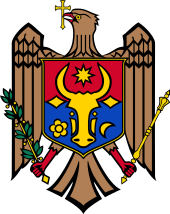Moldovan nationality law
| Moldovan Citizenship Act | |
|---|---|
 | |
| Parliament of Moldova | |
Long title
| |
| Enacted by | Government of Moldova |
| Status: Current legislation | |
Moldovan nationality law dates back to June 2, 2000 and has been amended several times, with the latest modifications being made in 2014. It is based on the Constitution of Moldova (articles 17, 18 and 19). It is mainly based on Jus sanguinis.
Dual nationality is allowed, under certain conditions.
Under the law, there are provisions for citizenship to be acquired by:
- Birth
- Recognition
- Adoption
- Recover
- Naturalisation
Citizenship by birth[]
You acquire citizenship by birth, if you fulfil any of the following requirements:
- Either of your parents is a citizen of Moldova at the time of your birth
- You are born on the territory of Moldova, and your parents are stateless persons
- You are born on the territory of Moldova, and cannot receive the citizenship of either of your parents
- Any foundling found on the territory of Moldova is considered a citizen unless proven otherwise, until the age of 18
Citizenship by recognition[]
You may gain Moldovan citizenship by:
- Being born in the territory of the Republic of Moldova or by having a parent, or grandparent who was born there
- Having resided in Basarabia, in the North Bucovina, Hertza Region, and the M.A.S.S.R. before 28 June 1940, or by being a descendant of such a prior resident and having lawful and habitual residence in the Republic of Moldova.
- Having been deported from or having fled the Republic of Moldova since 28 June 1940, or being a descendant of such a deportee or refugee.
Citizenship by naturalisation[]
Citizenship may be granted to anyone who has reached the age of 18, and who meets one of the following criteria:
- Has resided in Moldova lawfully and habitually for the last ten years; has been married to a citizen of Moldova for at least three years; or has resided lawfully and habitually for three years with parents or children (including adoptive) who are citizens of Moldova
- Has resided lawfully and habitually for five years before reaching the age of 18
- Is a stateless person or recognised refugee, who has been lawfully and habitually for at least 8 years
In addition they must fulfil the following criteria:
- Knows and observes the provisions of the Moldovan constitution
- Passed an exam in the national language
- Possesses the legal sources of income
Dual citizenship[]
Moldova allows its citizens to hold foreign citizenship in addition to their Moldovan citizenship. Acquiring a foreign citizenship, therefore, does not result in the loss of Moldovan citizenship.[1] Some countries, however, do not permit multiple citizenship e.g. adults who acquired Moldovan and Japanese citizenship by birth must declare, to the latter's Ministry of Justice, before turning 22, which citizenship they want to keep.
Controversy[]
On 28 September 2017, a new law allowing individuals to buy their citizenship for a fixed sum took effect. Moldovan pro-Russian president Igor Dodon tried to bring in investments from Russia stating that "The Moldovan passport could allow them to travel in Europe freely."[2] These provisions were repealed by a law that entered into force on September 1, 2020.[3]
References[]
- ^ "Moldova Dual Citizenship". Dual Citizenship Report. Retrieved 2019-04-11.
- ^ "Moldova Offers Passports to Cash-Rich Foreigners". Balkan Insight. 28 September 2017.
- ^ "Moldovan parliament cancels 'citizenship for investment' law". 19 June 2020.
External links[]
- Moldovan nationality law
- Moldova stubs